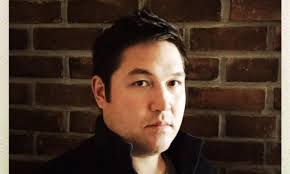
Michael Croley’s short story collection Any Other Place is a beautiful exploration of what it is to be a man in this country and in addition, what it is to be different. Croley is masterful in setting down character and place on the page.
Q: These stories feature men, young and old, learning or relearning how to be men in this world, how to be strong and vulnerable at the same time. What do you hope these stories say about men? What do these men hope to say about themselves?
Michael: I’m not sure I’m trying to say too much about men, but I think I grew up in a part of the world that was very male-dominated. I think I grew up around men who had a code of ethics with unwritten rules about what it meant to be a man. Some of those rules were good and some were bad. I think I was a pretty sensitive boy and, at the same time, very much of that male-dominated culture. I think the stories are trying to explore that, trying to give a sense of struggle, in part, of being two ways in the world.
I think I write a lot about men who feel misunderstood and can’t make themselves understood. They get in their own way. They can’t articulate their feelings because, in some ways, they don’t know how to access their feelings. I try to give them a voice by probing their interior.
Q: What about your own life informed the writing of these stories?
Michael: I grew up half-Korean in this small town that had a very racist past. I just never felt like I fit in, though as an athlete growing up—and a fairly good one—I’m sure no one else saw it that way. I started on the football team 3 years. I played varsity basketball 3 years. I was in the “cool” crowd in a town that really prized athletics. But I never really fit in. I never got comfortable. It was more than teenage angst. It was being half-Korean, being on guard for the occasional racial slur or joke. I didn’t realize how uncomfortable I had been as a boy until I was pretty far away from my childhood.
Q: Themes of loss and otherness thread through the collection. What about these particular concerns interests you?
Michael: When I was in high school (maybe college), I heard Stephen King say he wrote about what he was afraid of. His nightmares, I guess. Well, I thought that was a pretty smart approach, but I wasn’t afraid of rabid dogs or clowns. I was afraid of losing my family and I was afraid of not feeling like I might ever be comfortable in the world. The stories made me aware of my unconscious, which is a Jungian idea. I had a lot of unconscious fears about identity and what it meant to be from a place and how that place shaped you and if you could shack off those shackles.
Q: Kentucky is the physical landscape but it’s also the emotional landscape. What do Kentucky and North Carolina have in common? What’s different about them?
Michael: Well, we share the Appalachian Mountains, for one. And that region, more than Kentucky—though I love the state of Kentucky—really defines me. Appalachia transcends any singular state. Those of us from there feel painted with one brush and that brush is not one coated with vivid paint.
The main difference between Kentucky and North Carolina is that we have a better basketball team.
Q: You worked with Jill McCorkle. What did you learn from her that stays with you as a writer?
Michael: I learned I’ll never be as smart as her. I learned that she’s fiercely intelligent and wise and that her stories are packed with tenderness and that if you can make all three of those collide in a story, you’ll have a shot at being as remarkable as her.
Q: What can the short story do that the novel can’t?
Michael: I think a short story, because it’s read in one setting, has the ability to stop us in our tracks. I think of Joyce’s “The Dead,” which seems to meander and toddle at its friend. Gabriel fiddling with that damn speech, that nostalgic and sort of silly speech, but then you get in the room with him and his wife and he recognizes he will never stir as much passion in her as the long departed—and aptly named—Michael Furey. And his realization, the epiphany as Joyce termed it, is so chilling, so heartbreaking that you have to sit a few moments afterward and catch your breath. Novels can certainly move us like this, but you live with and experience a novel. A good story takes you by the head and pushes you under the water and leaves you dizzy.
Q: What’s next for you?
I’m always working on something. I’ve got an old novel I’d like to reboot and a new novel I’d like to spend more time on. The new novel features a character from the collection, Wren Asher, who is a Korean-American man from Fordyce, Kentucky. He finds himself working as an aide for a Korean-American senator from Hickory, North Carolina named Rodney Holcomb. Holcomb is everything Asher isn’t and in the senator’s greatness, Asher sees his own limitations as Holcomb rises to power.
Q: What do the men in these stories desire most?
Michael: Intimacy. I think that’s what we all want. Intimacy, for me, is about vulnerability and the acquisition of intimacy (as if it’s a business deal) is about someone accepting our vulnerable selves.
Michael Croley is a recipient of an NEA Fellowship in Literature in 2016. He is the author of Any Other Place: Stories. His stories and essays have appeared in VQR, The Paris Review Daily, Kenyon Review Online, LitHub, Narrative, and elsewhere. He teaches creative writing at Denison University.

